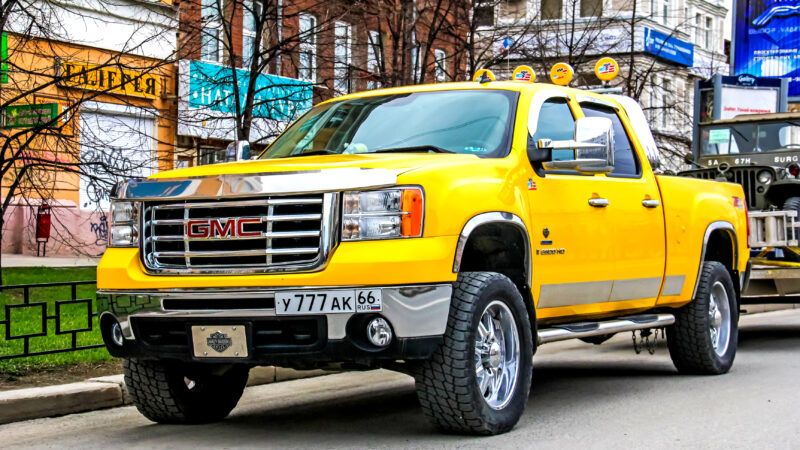Why Are Pickup Trucks Ridiculously Huge? Blame Government.
Regulations, tariffs, and other government-imposed hurdles reward American car companies for building bigger, more expensive trucks and keep out any potential competitors.

One of my favorite economic rules is simple. Whenever a progressive scold blames capitalism or private companies for a "market failure"—i.e., the inefficient or seemingly inexplicable distribution of goods or services in the economy—it's best to dig a little deeper. Almost always, some government regulation, tax, or law is largely to blame.
One recent example involves the proliferation of mega-pickup trucks. It doesn't take scientific analysis to notice these vehicles, which account for more than 20 percent of all passenger vehicle sales in the United States, have gotten huge. I recently parked my 2012 full-size V-8 RAM next to a new model in a parking lot and mine looked like a toy. They've gotten pricey, too. I paid $19,000 for mine brand new—and the average full-size pickup now approaches $60,000.
"Driving a large pickup or SUV increases the likelihood you'll kill or injure someone; its thirsty power plant… spews more air pollution and greenhouse emissions," according to a report last year in Bloomberg. This has, of course, led to calls for more regulation. The article focused on a proposal by the District of Columbia to impose a $500 annual fee on trucks that exceed 6,000 pounds. The European Union has proposed bans on U.S.-style trucks.
I generally don't care what other people drive, but critics aren't entirely wrong to point out the ill effects of mega-truck proliferation—or the oddity of using a 6,500-pound, 22-foot-long vehicle mainly as a grocery-getter. Pedestrian deaths have reached 40-year highs and the Insurance Institute for Highway Safety research shows that as trucks and SUVs have gotten taller and heavier, they likewise have posed greater risks to those outside the vehicle.
But before we engage in a regulatory frenzy, it might be wise to assess how we reached this point. Part of it is due to consumer demand and manufacturer marketing, but that's an insufficient explanation. I live on an acreage and need a truck for routine work duties and hauling a trailer. The anti-car zealots seem to think we all should get around on buses and bicycles, but the bigger question is why there aren't many smaller, affordable truck options.
The automotive media has been abuzz with stories about a new Toyota pickup truck (IMV 0) that, unlike even the smallest pickups available in the states, features a large and useful bed. It's relatively light and fuel efficient. It can be configured in myriad ways, including a flatbed. According to Road and Track, it was developed in Thailand, where nearly half of all new vehicle sales are pickups. It is a bare-bones affair, but—get this—will only cost around $10,000.
This pickup has an authentic "Road Warrior" vibe that, in my humble opinion, is much cooler than the "tries too hard and costs too much" Tesla Cyber Truck. Don't head to your Toyota dealership anytime soon, as it won't reach U.S. markets, although it will be sold in Mexico. I'm guessing even a $20,000 U.S. variant would sell like proverbial hotcakes, but U.S. regulations, tariffs, and other government-imposed hurdles won't allow it.
One reason U.S. pickups have dominated the marketplace dates back 60 years. "When the European Economic Community raised tariffs on imported chicken from the U.S., President Lyndon Johnson retaliated with a 25 percent 'chicken tax' on imported trucks and other items," wrote the Cato Institute's Daniel Griswold. It was aimed at Volkswagen, which used to sell great little pickups. It no longer sells them here, but "the tariff remains in place out of political inertia." It's no surprise these massive taxes (and tariffs are simply a form of taxation) lead to market distortions. Don't blame manufacturers (except for their lobbying to achieve market protections) when government is the culprit.
Basically, U.S. tariffs undercut the competition from foreign producers who specialize in smaller pickup trucks. American companies have always dominated the large truck market, so the lack of competitors helped them cement their dominance. Speaking of unintended consequences, the federal government's bizarre emission rules also led to the public's preference for larger SUVs and trucks.
Regulations promulgated during the Obama administration required cars "to meet tougher emissions and mileage targets than light trucks—a category that includes pickups and many so-called crossover vehicles that look like SUVs but have the mechanical underpinnings of cars," according to a 2020 Reuters report. As a result, car makers offered more vehicles that conformed to less-rigid light-truck standards.
The panoply of regulatory rules, labor standards, tariffs, and taxes also drive up manufacturing costs, which means car makers need to maximize profit per unit. That offers more incentive to push the priciest vehicles possible. Often, Detroit is fine with additional regulations, which cuts out upstart and foreign competitors. That's not market failure, but government failure. So those seriously concerned about massive pickups should consider less regulation rather than more of it.
This column was first published in The Orange County Register.


Show Comments (199)